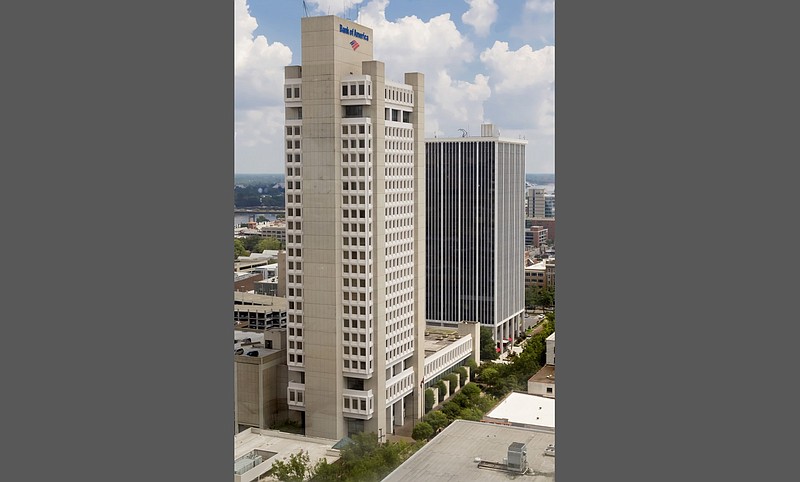The owner of the Bank of America building in downtown Little Rock wants to kick out its largest tenant, the law firm of Wright, Lindsey & Jennings, over a dispute involving $400,000 in unpaid rent and what law firm executives say is the poor condition of the 24-story skyscraper.
The building's owner, 200 Capitol West LLC, wants the firm of 60 lawyers not only to pay up but vacate the six floors in the building it has called home since it opened in 1969 as the Worthen Bank building, according to the lawsuit filed in Pulaski County Circuit Court.
At issue is three paragraphs in a lease amendment negotiated last year that allows Wright Lindsey & Jennings to abate 30% of its monthly rent "in the event of landlord's failure to substantially complete the contemplated" in each of the three paragraphs, according to the lawsuit, which was filed Wednesday afternoon.
"The thirty-percent (30%) abatement, which equals approximately $19,399.50 per month when applied separately and $58,198.50 per month when applied simultaneously, as WLJ has done in certain months, bears no relation to any contemplated or purported damages suffered by WLJ for Landlord's purported failure to substantially complete the upgrades and repairs contemplated by the Amendment," according to the pleadings.
Wright Lindsey & Jennings pays about $65,000 a month for the six floors it leases for its 90 employees, which include 30 support-staff members.
The lawsuit claims the owner has made $400,000 in repairs to the building and its heating and cooling system, elevators and public areas, conceding that some of the work was delayed because of the pandemic.
"Given the overall scope of the work completed, and the unforeseeable delays associated with the COVID-19 pandemic, the short delay in the completion of the work done ... did not render the building lobby and elevator upgrades ... incomplete and did not give WLJ the right to reduce its monthly rental obligation by thirty-percent (30%)," the lawsuit said.
The lawsuit called the reduction in rent payments "arbitrary " and a "breach of the lease," noting that the law firm "suffered no interruption or diminution in business as a result of Landlord's purported failure to substantially complete the upgrades and repairs identified in the Amendment."
The parties didn't contemplate that Wright Lindsey & Jennings would suffer any damages if the upgrades and repairs weren't completed, the lawsuit said.
But "even if WLJ could have been damaged as a result of landlord's failure to complete the upgrades and repairs, a thirty-percent (30%) abatements for each category of upgrades and repairs contemplated ... is clearly an arbitrary figure which bears no proportion whatsoever to the damages that might have flowed from Landlord's breach of any of the foregoing paragraphs in the amendment," the lawsuit said.
Reducing the rent 90% assumes the law firm has not been able to use 90% of its leased space, the lawsuit said.
"The items WLJ has identified as the basis for abating its rent, at least in part -- for example, cleanliness of elevator cabs, clocks failing to display the correct time, scuffs on walls, dirty ceiling tiles, and dead insects in light fixtures -- have not deprived WLJ of the use and enjoyment of any portion of the premises, much less ninety-percent (90%) of the premises," the lawsuit said.
At issue is the condition of the building heating and cooling system, damage to common areas from flooding over the winter and other items unbefitting of Class A office space, said Stephen Lancaster, the firm's managing partner.
The law firm expects to formally respond to the lawsuit as soon as today, he said.
Lancaster wanted to make clear that the law firm could afford to pay the rent, but under the terms of the lease negotiated last year wasn't required to pay all of the rent.
"This is certainly not a situation where we can't pay the rent," he said in an interview. "We're enforcing the terms of the lease. We've actually set aside all the money we've abated and have kept that in a separate account to demonstrate that this is not a financial issue."
"This is a landlord-tenant problem. We're simply enforcing the contract we negotiated."
Lancaster said renegotiating the lease to ensure the building was repaired and upgraded was the only alternative to leaving at the time.
"If the owner gets its way, we'll have to look at it more seriously," he said.
The owner, 200 Capitol West, purchased the building in 2006 for $10.2 million, according to the Pulaski County assessor's office. The building contains 290,681 square feet. It has a separate parking garage covering 148,410 square feet.
The building has been marketed as a property for sale in recent years, but no longer is listed on loopnet.com, an online marketing tool to sell or lease commercial properties.
The owner, named after the street address of the downtown tower, has a Los Angeles business address. The company is represented in the litigation by Aaron Heffington and Danielle Owens of the Little Rock law firm of Gill Ragon Owen.
The lawsuit has been assigned to Circuit Judge Herbert T. Wright Jr. The case is 60CV-21-4924.
